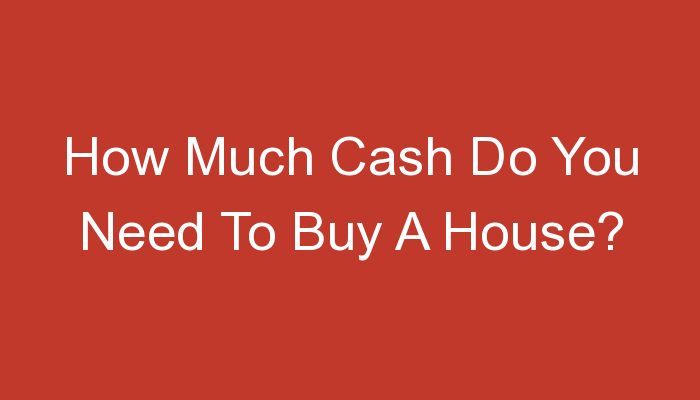Moving into a new house can be a daunting process. With so many decisions to make and paperwork to fill out, it can be difficult to know where to start. One of the most important questions you’ll need to answer is: how much cash do I need to buy a house? Buying a home is an investment that requires careful planning and consideration.
In this blog post, we’ll discuss the various costs associated with purchasing a house, as well as what you can do to better prepare yourself financially for the purchase. Read on for more information on how much cash you’ll need when buying a home.
The Down Payment
For many homebuyers, the down payment is the biggest obstacle between them and homeownership. A down payment is the portion of the purchase price that you pay up front when you buy a home. It’s different from the mortgage loan amount, which is what you borrowed to finance your home.
In most cases, you’ll need to put down at least 3% of the purchase price of your home in order to get a mortgage loan. Some lenders require 5% or even 10%, but these loans are harder to qualify for. If you’re able to put down 20%, you’ll avoid having to pay private mortgage insurance (PMI), which can add hundreds of dollars to your monthly mortgage payment.
The size of your down payment will also affect the interest rate on your mortgage loan. In general, the larger your down payment, the lower your interest rate will be. That’s because lenders view borrowers with larger down payments as less risky than those with smaller down payments.
If you’re not able to come up with a large enough down payment, there are still options available to help make homeownership possible. You can look into government-backed loans like FHA loans or VA loans, which don’t require a down payment. You could also consider finding a cosigner or using gift funds from a family member or friend.
Mortgage Insurance
Mortgage insurance is required if you are putting less than 20% down on a home. It protects the lender in case you default on your loan. Mortgage insurance typically costs 0.5%-1% of your loan amount per year, depending on your down payment and credit score. For example, if you are borrowing $200,000 with a 10% down payment and a credit score of 760, your mortgage insurance would cost $1,300 per year, or $108 per month.
Mortgage Rates
According to Bankrate, the average 30-year fixed mortgage rate is 3.75%. This means that if you’re looking to buy a $200,000 home, you’ll need to have $7,500 in cash for the down payment and closing costs.
If you’re able to put down more money, you may be able to get a lower interest rate. For example, if you have a down payment of 10%, your mortgage rate will be closer to 3.5%.
Of course, there are other costs that come with buying a home, such as monthly mortgage payments, insurance, and repairs. But the biggest upfront cost is typically the down payment.
So how much cash do you need to buy a house? It really depends on your situation and what kind of loan you qualify for. But in general, you should plan on having at least $7,500 for a down payment on your new home.
Home Maintenance and Repairs
It is important to factor in the cost of routine home maintenance and repairs when budgeting for your new home purchase. Even if you are buying a newly constructed home, there will be maintenance and repair costs associated with ownership. Ongoing expenses can include monthly subscription fees for a home security or alarm system, as well as the cost of regular pest control treatments.
There will also be occasional larger repair or replacement projects, such as fixing a broken appliance or leaks in the roof. It is recommended to set aside 1-3% of your home’s value each year to account for these unexpected costs. By planning ahead and budgeting for these potential expenses, you can help ensure that your new home purchase is financially feasible in the long run.
Property Taxes
Property taxes are one of the most important expenses to consider when buying a house. They can vary greatly depending on the location of the property and the assessed value of the home. In some cases, property taxes can be as high as 2% of the purchase price of the home. It is important to factor in property taxes when budgeting for a new home.
Conclusion
Buying a house is one of the most exciting milestones in life and it’s important to understand what kind of financial investment you will be making before taking the plunge. As you can see, there are many different factors that go into how much cash you need to buy a home, from your down payment size to closing costs and more. It’s important to research all of these aspects thoroughly before beginning the process so that you can make an informed decision about how much cash you’ll need for buying a house. Good luck!

